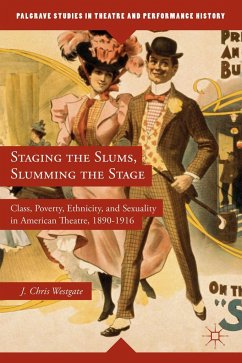Drawing on traditional archival research, reception theory, cultural histories of slumming, and recent work in critical theory on literary representations of poverty, Westgate argues that the productions of slum plays served as enactments of the emergent definitions of the slum and the corresponding ethical obligations involved therein.
"This book is a valuable resource for scholars of national and theatrical history ... providing not only an idea of popular dramaturgy, but of theatre and entertainment culture during this time and place. In that vein it is also a useful resource for sociological and ethnographic research because it examines the relationship among various entertainment and recreation trends and connects them to the social, political, economic, and ideological realities of turn-of-the-century New York." (Sarah Crockarell, Theatre Journal, Vol. 68 (1), March, 2016)
"Westgate's discussion of the plays and productions provides a wealth of theatre history as well as a rich cultural context for understanding it. Drawing with confidence on his knowledge of history and the relevant critical theory, Westgate makes his arguments clearly and persuasively. ... Staging the Slums, Slumming the Stage is a significant contribution to our understanding not only of American drama and theatre but also ofthe cultural and social history of the American Progressive Era." (Brenda Murphy, Modern Drama, Vol. 58, Winter, 2015)
"Westgate's discussion of the plays and productions provides a wealth of theatre history as well as a rich cultural context for understanding it. Drawing with confidence on his knowledge of history and the relevant critical theory, Westgate makes his arguments clearly and persuasively. ... Staging the Slums, Slumming the Stage is a significant contribution to our understanding not only of American drama and theatre but also ofthe cultural and social history of the American Progressive Era." (Brenda Murphy, Modern Drama, Vol. 58, Winter, 2015)









